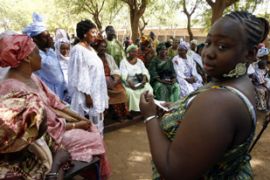Mali votes in presidential poll
Amadou Toumani Toure, the incumbent, is expected to win a second term.

Amadou Toumani Toure, who won praise for restoring civilian rule after he led a military takeover in the early 1990s, is seeking a new term as an independent candidate.
The former general ousted Moussa Traore in 1991 and installed a multi-party system before stepping aside in 1992. Ten years later he stood for presidential elections and won.
Toure, 58, does not have a political party, but enjoys the backing of two large coalitions and a myriad of small parties, including the Tuareg ex-rebels who once waged a separatist war in the northeast.
He is facing seven other candidates, the most credible being Ibrahim Boubacar Keita, a former prime minister and head of the national assembly, and the key opposition figure.
For the first time a female candidate is among the presidential hopefuls. Sidibe Aminata Diallo, 50, is a professor in town planning at the University of Bamako and has previously worked for Unesco.
‘Widespread fraud’
A former cabinet minister and now opposition politician Tiebile Drame of the Party for National Revival (PARENA) claimed “widespread fraud” in the polls, but did not elaborate.
Toure had earlier urged peaceful polling as he cast his ballot at an air force school in the capital Bamako.
 |
| Amadou Toure does not have a party, but he enjoys the backing two large coalitions [AFP] |
“My wish is that the elections go well, that Malians vote peacefully and freely,” he said.
Turnout was high in the first few hours of voting in the capital but slowed mainly due to searing heat, according to polling officers.
“All has gone well according to what our teams have observed, no incident has been reported,” said Gerard Latortue, former Haitian prime minister, who was an observer with the OIF organisation of French-speaking countries. More than 1,000 international observers were present for the vote.
Voter turnout
Fodie Toure, chief of the national electoral commission, expected voter turnout to be better than in 2002.
“In 2002, we had a turnout rate of between 10 and 15 per cent by midday, (but) this year we have exceeded that,” he told AFP without providing details.
Observers fear that the election could be marked by voter apathy after less than two-thirds of the roughly 6.8 million eligible voters bothered to collect their identification cards.
Summing up the mood of relaxed ambivalence, taxi driver Camara said voting “serves no purpose … because democracy is now well established in this country.”
In the last elections in 2002 and 1997, voter turnout in the former French colony fell under 25 per cent. About 19,000 polling stations had been set up in this vast, partly desert African country.
About 600,000 Malians living outside the country, half of them in nearby Ivory Coast, are taking part in the vote, officials said.
Despite being the third largest gold-producer in Africa after South Africa and Ghana, Mali is the world’s third poorest country, according to the UN. The majority of its 13.5 million people live in rural areas.
Mali gained independence from France in 1960, and was led by President Modibo Keita until he was overthrown in 1968 by Traore, who ruled for 23 years.